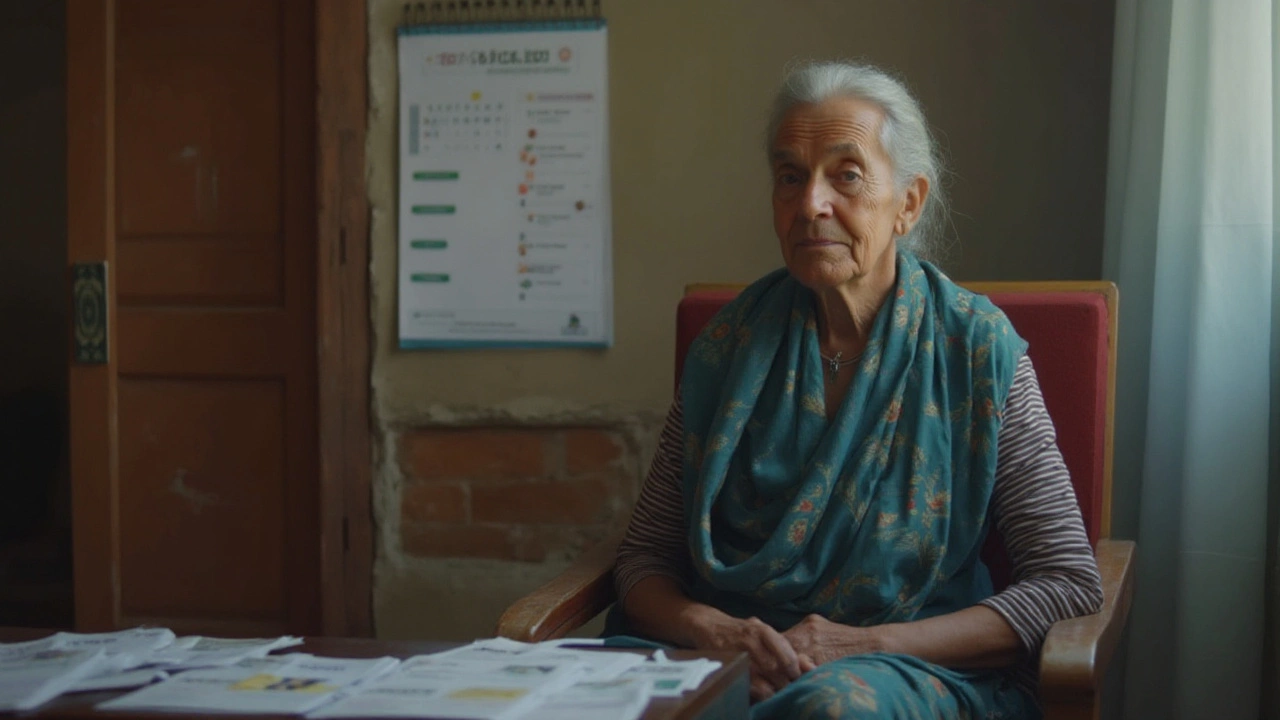Navigating Life Without Funds: The Reality for Dementia Patients

Dementia, a word heavy with meaning and emotions, sits uncomfortably at the intersection of health and financial anxiety for countless people. When the weight of cognitive decline meets dwindling financial resources, the challenges mount even further.
Imagine finding yourself, or a loved one, adrift in the vast sea of dementia with nothing in hand to pay for the lifeboat. The stark reality for many of these patients is the absence of sufficient funds to cover the cost of their growing needs.
In this piece, we will explore what happens when individuals facing dementia also confront the harsh limits of financial insufficiency. We'll look at available assistance programs, community support networks, and creative solutions that embody resilience in the face of adversity.
- The Financial Strain
- Public Assistance Programs
- Community and Family Support
- Innovative Care Solutions
The Financial Strain
Navigating the turbulent waters of dementia care, especially when money is scarce, is like trying to remain calm on a sinking ship. Without a solid financial plan or resources, families often find themselves scrambling to cover costs that seem to skyrocket overnight. The typical expenses range from medical bills, prescriptions, caregiver fees, to special dietary needs, and even transportation expenses for doctor visits. These obligations place a financial strain on families already burdened by emotional stress. According to the Alzheimer’s Association, in 2023, the estimated annual cost for dementia care in the United States was over $340 billion. This staggering number highlights an undeniable reality—dementia care isn't cheap, especially for those without resources.
What many people might not realize is how early these costs can start to add up. Even before the disease reaches a severe stage, initial diagnostic tests and treatments alone can eat into a family’s savings. Consequently, the average family might find its nest egg greatly diminished when faced with the relentless demands of dementia care over an extended period. Couple this with the fact that many dementias commonly appear in individuals over 65, a bracket where fixed incomes from pensions or social security are commonplace, and you begin to see why the financial aspect is overwhelming. An insufficient financial plan can lead to difficult decisions about which treatments or supports are possible.
While Medicaid does offer some relief for low-income individuals, the application process can be lengthy and intricate, often requiring proof of minimal assets. This bureaucracy sometimes leaves patients between a rock and a hard place, needing immediate care but lacking either wealth or time to wait through procedural delays. Families frequently confront painful choices, having to sell valued family homes or heirlooms just to get by. The turbulent juggling act doesn’t stop here, as time taken off work for familial caregiving further compounds the financial impact.
The emotional and financial strain that dementia places on families is tremendous and all-encompassing," says Dr. Rebecca Tanner, a researcher specializing in geriatric care. "Without proper support and resources, it can feel insurmountable."
The unpredictability of dementia’s progression compounds the financial puzzle. Budgeting becomes a Herculean task as families attempt to save for unforeseen future complications, such as potential hospitalizations or the necessity of full-time care. While some families look to long-term care insurance, those options must be secured well in advance of dementia’s onset, which isn’t feasible for everyone. For those already living day-to-day, financial planning often takes a backseat to survival, leaving them unprepared when dementia strikes. Family members should also note that out-of-pocket costs can be significant even with insurance to reduce the financial strain of such unbearable conditions.

Public Assistance Programs
Confronted with dementia, many patients and their families often find their finances straining under the weight of medical and care costs. For those who lack substantial savings or insurance, public assistance programs become a crucial lifeline. In many countries, various government programs aim to offer support for dementia care. For instance, in the United States, Medicaid provides health coverage for those with limited income and resources, and it stands as a pivotal source of financial relief for many. It is particularly vital for long-term care, which is not typically covered by Medicare. Meanwhile, state programs and waivers can help fund specific needs such as home modifications or special equipment, easing the burdens that patients face.
Medicaid is not the only avenue; community-based programs and services funded through the Older Americans Act, like Meals on Wheels, deliver necessities directly to those in need, thus reducing their day-to-day expenses. Another significant resource is the Supplemental Security Income (SSI) program, designed to support individuals who have little or no income by offering cash to meet basic needs for food, clothing, and shelter. Programs like these, when leveraged smartly, can mean the difference between mere survival and attaining a semblance of dignity amidst adversity.
Access and Application Process
Applying for these programs often demands patience and perseverance, as bureaucratic processes can be daunting. The first step is invariably gathering all necessary documents, including proof of income, medical diagnoses, and citizenship status. Local social service offices or senior centers are excellent starting points for advice and application assistance. Engaging with non-profit organizations dedicated to aiding the elderly and those with mental health disorders can also offer valuable insights and help navigate these complex systems. The Alzheimer's Association, for instance, not only provides educational resources but can also guide families through this labyrinth.Interestingly, according to a recent study published by the Journal of the American Geriatrics Society, more than half of those eligible for such assistance lack the knowledge or resources to apply effectively, underscoring the dire need for increased awareness and community engagement. This highlights a critical gap between available resources and accessibility, one that both government and local communities are constantly seeking to bridge.
A health official once noted, "Public programs stand as a testament to our commitment to care for our most vulnerable citizens. They aren't just about providing financially; they're about giving back dignity and respect to those who need it most."
Global Perspectives
What about elsewhere across the globe? Countries with national healthcare systems, like the UK and Canada, offer more streamlined public assistance to the financially disadvantaged. The National Health Service (NHS) in the UK and Canada's Publicly Funded Health Care system provide frameworks that integrate medical and supportive care, helping patients with dementia care needs without crippling costs. Recognizing the differing natures of such assistance worldwide offers a glimpse into not only the diverse strategies employed but also inspires the continuous evolution of these programs to better serve those in need.For those embarking on the difficult path of seeking assistance for elderly care, understanding these programs, both locally and internationally, can significantly ease the journey. While the road may be fraught with challenges, the potential for meaningful relief, offered both by public programs and community-driven initiatives, provides hope and a sense of possibility for a better tomorrow.

Community and Family Support
Support from the community and family can be the bedrock of stability for dementia patients with limited financial resources. Many times, families are left grappling with the choices of care and the means to afford it, but often they underestimate the power of community-driven initiatives. Communities across the globe have developed ways to support their aging population, and these can be lifelines for individuals without the means to pay for private care. By reaching out, families can discover a wealth of support beyond just medical assistance—think activities, respite care, and wellness sessions designed specifically for elderly care. These programs can be more than just a service; they offer community, dignity, and a sense of belonging.
Grassroots organizations often partner with local authorities to deliver programs designed to ease some of the burdens faced by struggling families. From social gatherings that provide a change of environment to volunteer services offering routine home visits, these initiatives are invaluable. They foster connections, sparking a little light into what can often be a dark time in someone's life. "It takes a village," we often hear, and nowhere is that more true than in supporting dementia patients. Family members may find incredible community groups available, which not only provide tangible resources but also emotional backing.
Family support, while essential, can sometimes be strained by the demands of caring for someone with dementia. It requires a great deal of understanding, patience, and time, which can be daunting for any family facing these challenges. However, sharing these duties among relatives can alleviate some of the workload and stress. Creating a shared calendar to coordinate visits, appointments, and care schedules can keep everyone on the same page, ensuring the patient gets the right care at the right time. It’s crucial for families to maintain open communication lines, voicing concerns and adjustments to care as needed.
Moreover, digital platforms now serve as an important hub for caregivers and family members seeking knowledge and connection. Families can access resources such as online forums, webinars, and educational videos, enabling them to better understand the nuances of dementia care. These tools bring people together across distances, offering advice, companionship, and insight into common challenges faced by others in similar situations. Online communities can provide solace and new advice for family members who feel isolated.
"In the face of challenges, remember that communities can offer surprising strength and resolution," said Mary L. Kedem, a renowned gerontologist. "Families that tap into local resources often find themselves better prepared and less overwhelmed by the road ahead."
Building a Support Network
To improve the quality of life for dementia patients, building a strong support network is more than prudent—it's essential. Begin by identifying which family members can reliably participate in caregiving tasks. If possible, designate roles to everyone willing to contribute, with respect to their availability and skills. This division of labor helps ensure that no one person becomes overburdened. Incorporating friends or neighbors who are willing to dedicate their time further strengthens this network, providing relief and varied interactions for the loved one.

Innovative Care Solutions
In our fast-paced, ever-evolving world, we continually strive to find new ways to care for our most vulnerable populations, including those living with dementia. For individuals without the financial resources to afford traditional care, creative solutions are emerging. These solutions leverage community spirit, technology, and empathy to provide dementia care options that are both sustainable and effective.
Technology plays a pivotal role in the landscape of dementia care. Smart home devices, once considered luxuries, are becoming essential tools. Devices such as smart speakers, cameras, and alarm systems can help monitor patients, remind them of daily tasks, and provide a semblance of safety. For families unable to afford constant professional care, these systems provide much-needed relief, ensuring loved ones are watched over and that their safety is accounted for.
"When deployed thoughtfully, technology empowers patients to maintain independence and dignity," says Dr. Emily Fernandez, a gerontologist with the Aging Well Initiative.
Alongside tech solutions, community-driven models are redefining care for the elderly and those with dementia. Programs have been set up in cities around the world where volunteers - often young individuals or retirees - visit and assist those in need. These volunteers help with everything from running errands and preparing meals to providing companionship and a sense of belonging. Such initiatives not only lighten the caregivers' load but also strengthen ties within communities, fostering an environment of mutual support.
Additionally, we witness the rise of alternative elderly care models like co-housing and intergenerational living. These arrangements allow elderly individuals to live with younger people or other seniors, sharing resources, expenses, and care responsibilities. The dynamic results in a supportive environment that mitigates loneliness while also being cost-effective. It's a heartening reminder that financial constraints don't necessarily spell isolation and neglect.
Government and non-profit organizations are also joining the fray, crafting policies and programs that prioritize accessible care solutions. One of the more progressive initiatives is the provision of respite care vouchers for low-income families. These vouchers offer temporary relief by allowing caregivers some time off while ensuring their loved ones are well cared for. Such measures highlight the importance of mental health support and the well-being of both patients and caregivers.
Data illustrates that communities with robust support networks experience better outcomes in terms of mental health and longevity for individuals battling dementia. According to a recent study by the Institute of Aging Research, individuals engaging with social innovation programs reported a 30% higher quality of life index than those without access.
The landscape of dementia care is continuously evolving, driven by the need to find inclusive and viable solutions for those with limited financial means. These innovative methods weave together technology, community, and governmental support, painting a hopeful picture for the future. Just as dementia doesn't discriminate by economic status, neither should our compassion and determination to provide supportive care for all affected by it.